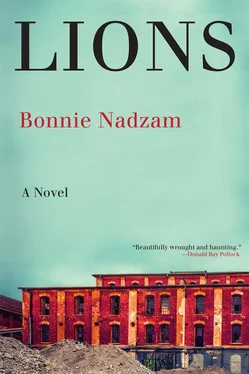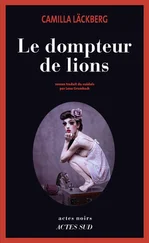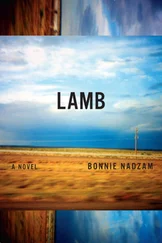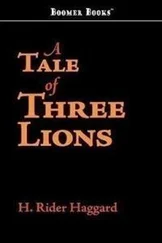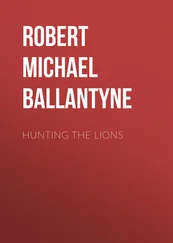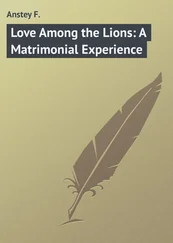Of all its haunts, one of the scariest place in Lions was Echo Station, named after a children’s game featuring an abandoned gas station on the far west end of town where giant weeds had cracked up the concrete and spread the broken pieces apart like a clay dish shattered against the hard ground.
It hadn’t been a large gas station, just a single bay wide enough to pull in and lift a single car, and a small, glass-cased room with a register and cooler, and a toilet behind a small door. The glass had long since been broken, and there’d been nothing in the place in recent days but a single piece of bent rebar pointing like a bony finger right at the doorway, where you’d stand looking in. The gas station had been built on the same site as an old sod stagecoach station of a hundred years before, which had later been chosen as the spot for Lions’ railroad station. There’d been tremendous hope that the railroad would be directed through Lions. It would have enlivened the town and brought all kinds of people and quality products and services everyone missed from back east. Burnsville, however, was chosen instead. So even when the gas station was new, it was felt sharply as a place of disappointment. Add to this that the gas station didn’t last a single year — a town the size of Lions didn’t need two, and the Gas & Grocer had bread and canned food and fresh milk. Given the chance, the people of Lions might have excised it from their maps of town. It was a symbol of regret, of bad decisions, of misplaced hope.
After its owners left for Denver, the station was looted and for years stood empty and open to the elements. It ate all the sleet and rain and sun and wind, and seemed when you passed by to want to suck you in, as well. First, children in the backseats of their parents’ cars took to holding their breath when they passed it. Then they began visiting the place on foot, in twos and threes, the way people in a larger city might go to have their palms read, or fortunes told.
You were supposed to stand before the empty gas station alone — your friends had to wait a good hundred feet off — then close your eyes, make three counterclockwise circles, count backward from twelve, and open your eyes. Immediately in the space before you, the dust and light would take the form of either a past or future self who had some kind of directive. This could be a single word, an image, a feeling, or the name of a distant city. It might be the shape of something, like a key or an apple or a door that you would have to look for in your life as a sign by which to get your bearings. But as you stood there before the whirling dust at Echo Station, you wouldn’t be able to tell if you were being guided by a self who was young and full of wishes, or old and full of wisdom — so the sign could lead you to a life either of peace and abundance or of poverty and bitter sorrow. Once you put your faith in Echo Station, however, and closed your eyes and turned three circles, it was too late. Your fate was sealed, the direction fixed.
It was a game that had almost passed out of knowledge by the time Leigh and Gordon were kids in Lions, and it was Dock who told them about it. They were at the diner eating ice cream and pie one summer night, and Annie had just taken Emery to the bathroom. Boyd was new in town that summer and up at the counter talking to May, who kept smoothing her hair and smiling.
“We wanted a ghost story,” Gordon said when Dock told him and Leigh about the game. “That’s not a ghost.”
“I don’t know,” Dock said. “Scary enough for me. I wouldn’t play it, that’s for sure.”
“Really?” Leigh asked. She licked her spoon. “You never did?”
“Nope,” Dock said. “Never have, never will. Grown-ups know better than to go looking into the abyss. Besides. Don’t I already know how my life turned out?”
“Scaredy-cat,” Leigh said.
“You bet I am.”
“Let’s do it, Gordon,” Leigh said.
Gordon put his napkin on his empty plate. “No,” he said slowly. “I think I’m with Dock.”
“Come on.”
“I don’t get it, anyway,” he said. “You won’t even know if you’ll get rich and happy or sad and poor. You’ll just know that you’ve made it stick.”
“That’s right, Gordon,” Dock said, and pointed at him. “Don’t even play that game.”
Gordon crossed his arms and smiled and repeated it to Leigh. “Don’t even play it.”
That night Leigh walked alone through town in her nightgown and tennis shoes, and stood among weeds almost shoulder high, and closed her eyes, and made three circles in the dark. On her way home, smiling, she stooped in the middle of the road and drew a heart in the dust with her finger.
Gordon woke at home in his room in early evening, sunlight leaping like copper-colored flames among the tree leaves outside. Smell of toast and coffee from the kitchen below. The clatter of cookware. He couldn’t have said what day it was, or how long he’d slept, but when he sat up straight his mind felt sharp. Outside the window, a shimmer of dandelion floss. The dry fields creaked. He could hear them.
Down the hall and stairwell, the wall clock, the framed wedding stills of his parents, grandparents, and great-grandparents, even a very blurry, grim image of his great-great-grandparents in white ballooning clothes that looked as though they’d been fashioned from boat sails, and each of the smooth wooden steps, the flowers and stripes of the wallpaper — it was all looking out at him.
“Grief wakes you up,” his father had once said, talking of the loss of his own father. “You might not want it to, but it does.”
Now there was nowhere to hide. That Gordon had ever taken comfort from such things. From moonlight on the sidewalk. From wind in the trees. From familiar silverware, or clothbound covers of old books, or the faces and gestures of those he loved. The longer he looked at these things in the days to come, the more familiar and simultaneously puzzling they seemed. He put his hand to his head and went down the steps while all around him, the nail heads and floorboards announced that they were no longer simply what they appeared to be, though they were quite clearly nothing but nail heads and floorboards.
Downstairs, the front door was open. Outside the air was still hot from the day and smelled of the Sterlings’ small hog lot. Only late June and the clump grasses were already blond. Bindweed and vetch curled and spread themselves in a purple tangle over the ground. A warm wind bent the line of young alders John had planted, and sheets and thin, white tea towels billowed and leapt on Georgianna’s clothesline like long parallelograms of pale blue light.
Georgianna was sitting in John’s old chair with one small, heavy glass of whiskey beside her. His reading lamp cast a circle of yellow around her in the dim room, but her face was chalky. She was not reading but looking into the middle distance, like a woman under a spell.
John’s routine after work always went like this: washing his face and scrubbing his hands with Lava soap, then coming down for supper, and performing a little ceremony Gordon watched with great interest as a boy. In the cabinet just over the silverware drawer, where Georgianna kept measuring cups, an old red and black cardboard check box filled with rubber bands and paper clips, and an old, smooth, bent horseshoe, there were two heavy shot glasses, with one teardrop of air inside the bottom of each. Sometimes, Gordon would go into the kitchen and take them out of the cabinet and weigh them in his hand. Cool and heavy, like magnifying glasses. His father would fill them each up to the top with whiskey, and drink one standing there by the sink, all in one motion.
Читать дальше
